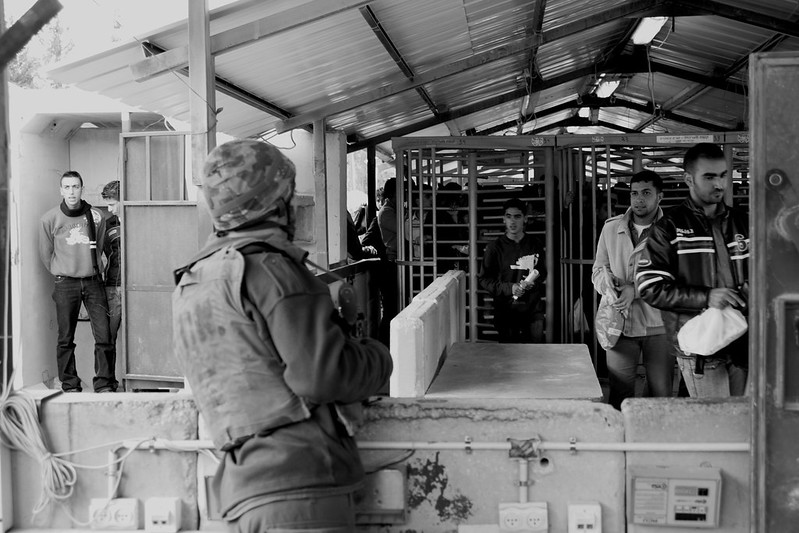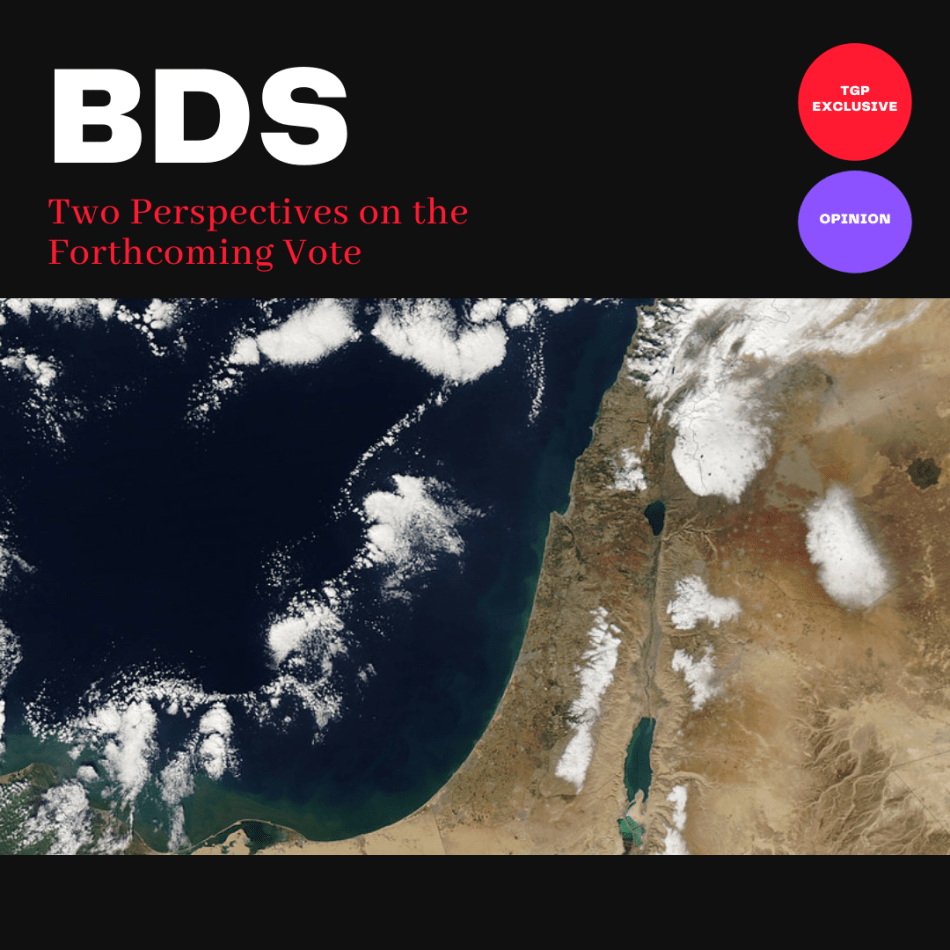By Ximena Osorio Garate and Massimiliano Masini
A Note from the Graduate Press Editorial Board:
On Tuesday, April 27th, 2021, the Graduate Institute student body will be called upon to vote regarding whether to endorse the Boycott, Divestment, and Sanctions (BDS) movement. The Graduate Press, in its commitment to empowering all student voices and opinions, presents two perspectives on the forthcoming vote. These pieces, “Why endorsing the BDS movement is not supporting the Palestinian cause” by Vanina Meyer, and “Standing in solidarity with the Palestinian people: the BDS and Apartheid-Free Zones movements” by Ximena Osorio Garate and Massimiliano Masini, are being published in the spirit of allowing students to inform themselves about the vote, as well as providing a space for critical and constructive discussion.
Please note that the views, opinions, and assumptions expressed in these articles are those of the authors and do not necessarily reflect the opinion or position of The Graduate Press Editorial Board. Our mission is to provide a neutral platform for the student body to be able to engage in open dialogue on complex issues.
…
This article articulates the reasons for supporting the call for endorsing the BDS and the Apartheid-Free Zone movements. While these two movements have various strategic advantages and limits, about which we invite you to read in the resources provided here and in the call for the vote, we want to state clearly that the BDS movement constitutes the widest Palestinian-led network of transnational solidarity. The movement brings together communities and grassroots organisations across the diverse landscape of Palestinian society and political architecture due to the different statutes of the territories recognised as Palestine (elaborated below). As such, our endorsement of the BDS movement as well as the Apartheid-Free Zone movement would denounce the forms of oppression that Palestinians continue to face at the hands and force of the Israeli colonial regime.
Two years ago Tareq Abu Mattar was admitted to the Anthropology and Sociology Master’s program at the Graduate Institute, but he never made it to Geneva. Israel controls and restricts the movement of Palestinians in the Occupied Territories, and after Tareq was admitted Israel banned him from leaving Palestine to pursue his studies. He was then arrested, brutally tortured, and has now been sentenced to four years of imprisonment in an Israeli prison. He is one of the 4450 Palestinian political prisoners incarcerated in Israeli prisons, including 140 child prisoners and hundreds of Palestinian students.
University students who, like Tareq, are active members of their community, are particularly targeted by the Israeli security forces, and are frequently subjected to torture in detention. Under interrogation, Tareq was brutalized with a number of torture methods, including numerous stress positions, hanging, and bone breaking. He was transferred to court sessions on a wheelchair.
Palestinian prisoners also face a higher risk of contracting COVID-19 in overcrowded Israeli prisons and amidst the pandemic, Israel has continued to attack Palestinian hospitals in Gaza and the West Bank, it has confiscated humanitarian tents meant for use as field clinics, and increased demolitions of Palestinian homes. It has continued to deny Palestinians in the Gaza Strip access to healthcare and systematically neglected healthcare in occupied East Jerusalem. Following intense international pressure, Israel vaccinated the Palestinian labor force that works inside the Green Line1 and Palestinian prisoners held in its prisons, however, this ‘vaccine apartheid’ is only one dimension of the reality of living under military occupation during a global pandemic.
Earlier this year, the largest Israeli human rights organization, B’Tselem, released a report denouncing Israel’s apartheid regime from the Jordan river to the Mediterranean Sea. The report describes a regime that divides, separates, and rules Palestinian people and territories, governing and defining each unit differently, granting its populations different rights. Palestinians living in Israeli land as defined in 1948 are citizens of Israel, yet they do not enjoy the same rights as the Jewish Israeli population and are considered second-class citizens in both practice and law. Palestinians of East-Jerusalem are defined as ‘permanent residents’ of Israel, yet they are not entitled to citizenship and their residency can be revoked at any time, leaving them stateless. Palestinians in the West Bank live under Israeli military rule and have no political rights; their land is increasingly occupied by illegal settlements, and they face constant threats and attacks from settlers. The United Nations has condemned Israel’s military justice system in the West Bank, which has a near 100% conviction rate for Palestiains, as a violation of international law. Meanwhile, Israeli settlers are tried under civil law with a conviction rate of 5%. Finally, Palestinians in the Gaza Strip live under a military blockade imposed by Israel, allowing the state to control nearly every aspect of their lives.

As students of the Graduate Institute, Geneva, we do not exist outside of politics. Our education, bodies and our practices are inherently part of international politics. As we go on with our professional lives at the United Nations, the International Committee of the Red Cross, International Organizations, NGOs, government, and academia, we must remember that our privileges and our proximity to centers of power entails a huge responsibility.
“Let me tell you a story that might bring some laughter”, Tareq writes to us from prison, “As I was subjected to prolonged interrogation and torture methods in al-Mascobiyya interrogation center, two delegates from the ICRC came to visit me. At that time, I was extremely tired; my body frail and exhausted and with no energy given the brutal torture methods I was subjected to. I was wondering what I might be able to tell these two delegates: I had known very well that the ICRC cannot do much in front of this brutal and ugly regime but I was also in a need to talk to people since we were utterly isolated from the outside world for weeks. I asked both of them where they had studied, they both responded by saying they graduated from the Graduate Institute. I smiled: what irony does this life have for us? I told them I was supposed to commence my studies in Geneva, but I found myself in dark cells unable to walk and move due to Israeli torture. What irony is this.”
Around the world, university students, associations and unions, and academics are standing in solidarity with the Palestinian people. In 2005, inspired by the South-African anti-apatheid movement, Palestinian civil society organizations came together to call for boycotts, divestments, and sanctions (BDS) as non-violent actions to put pressure on Israel until it complies with International Law. The BDS movement has three concrete demands concerning the human rights of the Palestinian people: 1) an end to the illegal occupation and colonization of Palestinian lands and the dismatling of the Wall; 2) recognizing the fundamental rights of the Arab-Palestinian citizens of Israel to full equality, and 3) respect, protect, and promote the rights of Palestinian refugees to return to their homes and properties as stipulated in UN resolution 194. Since the call, the BDS movement has turned into a Palestinian-led global movement for freedom, justice, and equality, and a platform for transnational solidarity with the Palestinian people. Guided by the Universal Declaration of Human Rights, the BDS movement upholds the principle that Palestinians should have the same rights as the rest of humanity, and opposes all forms of racism, including Islamophobia and anti-semitism.
Similarly, the Apartheid Free Zone campaign is born out of local action by civil society to stand in solidarity with the Palestinian people and, like the anti-apartheid movement in South Africa, to garner international pressure on Israel to end its apartheid regime. Across Europe, and now in Switzerland, apartheid free zones have been created as spaces that reject any form of racism and discrimination, including that of the Israeli apartheid regime, and that uphold the human rights of the people of Palestine and Israel regarldess of their ethnicity, religion, sex, gender, and sexual orientation. In Geneva, forty-nine academic, cultural, student, and labor associations have already signed the Apartheid Free Zone declaration, refusing to be complicit with Israeli apartheid and extending their solidarity to the Palestinian people.
In the words of Tareq: “I believe that when we realize and find the truth, we become responsible for attaining it. For this, I believe in you for exposing the Israeli colonial regime and working towards the cause of the Palestinian people. This regime is not just a settler-colonial regime but a genocidal one as well, and we have a duty to confront it. Do not accept to be in a relation with such a regime that brings to mind the Apartheid system in South Africa. You have a duty as academics, intellectuals and students to boycott Israeli academic institutions and expose this violent colonial regime. This is the minimum you can do against this regime.”
Tareq is a student, he is an activist, he is Palestinian, and he should be part of our wonderful community at the Graduate Institute: studying, struggling, enjoying, and living beside us. In freedom and equality, free of torture and violence.
Let’s get this done. Together.
1: The demarcation for Israel’s territory as defined in the 1949 Armistice between Israel, Jordan, Egypt, Lebanon and Syria, following the Palestinian Nakba or the displacement of 700,000 Palestinians by Israel (see: Pappé, Illan, The Ethnic Cleansing of Palestine, Oneworld Publications, 2007)
…
Note:
In preparation for the ‘Vaccine Apartheid’ event organized by the Graduate Institute Student Association (GISA) Board on April 14th, the organizers were able to get Tareq’s testimony and letter. His words are his personal testimony from prison sent to the organizers for the purpose of the event, and he has given his verbal informed consent to the organizers to publish excerpts of it in this article.
Students at the Graduate Institute can request the recording of the event to the GISA Administrative Director.
For Tareq’s safety, we cannot disclose further details surrounding his testimony, in accordance with article 126 of the 1949 Geneva Convention III and article 143 of the 1949 Geneva Convention IV.

0 comments on “Standing in solidarity with the Palestinian people: the BDS and Apartheid-Free Zones movements”